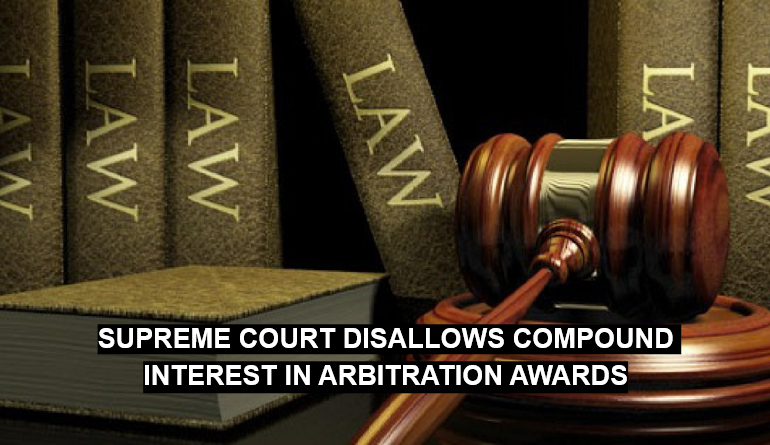SUPREME COURT DISALLOWS COMPOUND INTEREST IN ARBITRATION AWARDS
Introduction
In a recent Supreme Court of India judgment on the Special Leave Petition (Civil) No. 812 of 2014, the legal intricacies surrounding the award of interest in an arbitration case were scrutinized. The parties involved were, M/S D. Khosla and Company (the Petitioner) and the Union of India (the Respondent), relating to a contract dispute from 1984-85.
Facts and Lower Courts’ Decisions
The Arbitrator, under the Indian Arbitration Act, 1940, passed an Award on 17.09.1997. This Award included a decree for Rs. 21,56,745 and specified interest rates for two periods:
1) Simple interest at 12% per annum from the date of completion of the work to the date of the Award.
2) Simple interest at 15% per annum from the date of the award until the payment date or the court decree date, whichever was earlier.
The Petitioner contended that for the post-Award period, the 15% interest should apply to the principal amount plus the 12% interest from the pre-Award period, i.e., the Petitioner sought to include 12% interest in the principal amount of compensation awarded for the purposes of claiming 15% simple interest for the post-award period. However, the Principal Senior Civil Judge, Khambhalia vide Order dated 29.08.2008, and subsequently, the High Court, refuted this claim vide Order dated 06.09.2013.
Aggrieved by the Orders of the Principal Senior Civil Judge, Khambhalia and the High Court, the Petitioner filed a Special Leave Petition (Civil) No. 812 of 2014 before the Supreme Court.
Supreme Court Analysis
The Supreme Court, vide Order dated 07.08.2024, examined several key points:
A) Nature of Interest in Arbitration Awards:
1) The Apex Court reaffirmed that, under Section 29 of the Indian Arbitration Act, 1996, interest in a decree is payable only on the principal sum adjudged by the award.
2) Similarly, under Section 34 of the Civil Procedure Code, 1908 (CPC) (Interest), interest is payable on the principal sum adjudged, not on any accrued interest.
B) Prohibition of Interest on Interest:
1) The Supreme Court observed that, the Interest Act, 1978, vide Sub-Section (3) of Section 3 states that:
Nothing in this Section, –
a)….
b)…..
c) shall empower the court to award interest upon interest.
2) Therefore, it clearly states that ordinarily the courts are not entitled to award interest upon interest unless specifically provided either under any statute or under the terms and conditions of the contract.
C) Award and Decree Examination:
1) The Apex Court found that both the Award and the subsequent decree clearly delineated interest rates for the principal sum adjudged (Rs. 21,56,745), without including the pre-Award interest in the calculation for post-Award interest.
2) The Supreme Court concluded that the interest for the post-Award period (15% per annum) applied solely to the principal sum, not including the 12% pre-Award interest.
Conclusion
The Supreme Court, upon perusal of all the facts and circumstances of the aforesaid case, dismissed the Special Leave Petition, and held that it was not required to exercise the discretionary jurisdiction under Article 136 of the Constitution of India to interfere with the decisions given by the lower courts, thereby upholding the decisions of the lower courts.
Kartik Khandekar
Senior Associate
The Indian Lawyer & Allied Services





































Leave a Reply